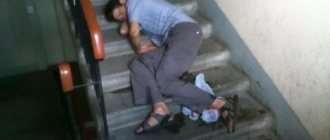The current legislation of the Russian Federation states that every citizen who owns residential real estate or rents it is obliged to pay utility bills on time. If we refer to Art. 153 of the Housing Code of the Russian Federation, then the procedure for paying utility bills is prescribed there, and if the debts of the defaulter have reached a certain level, then he can be evicted in court.
In this article we will look at a question that interests many Russian citizens: “Can they be evicted from a privatized apartment for rent arrears ?”
What are the grounds for eviction from a privatized apartment?
There are a number of grounds according to which it is possible to evict a citizen from his home:
- The owner of the residential premises has not paid utility bills for more than 6 months.
- Regular violation of the rights of a cohabitant, due to which it is impossible to live together under the same roof.
- The owner or other citizens (for whose actions and actions the owner of the property is responsible) caused damage to the premises. For example: unauthorized unauthorized redevelopment of an apartment.
- Residential real estate is not used for its intended purpose. For example, a service bureau or store was set up in the apartment.
Eviction for utility debts
If we turn to Article 90 of the Housing Code of the Russian Federation, it says that if a citizen and his family, without good reason, do not pay utility bills, then they can be evicted through the court.
But in the event of such a development of events, the family must be provided with other housing, which is registered in their name under a social tenancy agreement.
Important! The living space provided to the family is allocated in accordance with the standards for living in the hostel. Each region sets its own standards.
There are a number of reasons that the legislator recognizes as valid for non-payment of debts on utility bills. Among them:
- Family members lost their jobs.
- A key family member is ill or seriously injured.
- Salary or pension is delayed.
- The citizen is unable to find a job.
There are many reasons that the court will take into account.
It is important to know! Remember that the owner of a residential premises (privatized apartment) cannot be evicted for debts on utility bills.
The legislation of the Russian Federation does not provide for such an option.
How does eviction from a municipal apartment happen for debts?
If a citizen lives in a municipal apartment, he can be evicted according to the following scheme:
- If a citizen does not pay for utilities for a long time, no warnings have an impact on him, and the amount of debt continues to increase, the owner is obliged to once again warn the owner that other methods of influence will be applied to him. According to current legislation, it is prohibited to turn off heating and sewerage, but the relevant services can turn off electricity and gas.
- A claim can be filed only when a citizen does not pay utility bills for more than six months.
- The right to collect the full amount of the debt can be obtained based on a court decision. You will need to pick up the writ of execution, and then, using it, collect the debt from income and property.
How can a debtor delay a bailiff’s visit?
The defaulter has the right to postpone the visit of the bailiff, but only with the filing of an appropriate application or upon filing an appeal against the court decision.
The application for deferment is submitted immediately to the judge - after the decision to collect a sum of money or property from the defendant to pay off the debt. The application will lead to a new court hearing, as a result of which the defendant will be released from paying the debt in a lump sum. In such cases, the defendant is granted a deferment of several months or more.
To achieve a deferment of debt payments, you must provide evidence of its necessity. To do this, the debtor submits the following possible documents:
- evidence of lack of income - being on maternity leave, sick leave;
- copies of all payment documents - payment of utilities and other obligatory expenses;
- a schedule of payments available to the defaulter - but only moderate, designed for the shortest possible time.
The apartment will not be taken away if the court makes a verdict on payment of the debt according to the approved schedule of the debtor himself.
For debts to the bank on a loan
A citizen can be evicted from a privatized apartment for debts if he has mortgage debts and does not repay them on time. The bottom line is that when a mortgage is taken out, the real estate becomes collateral.
But even here there are small loopholes on how to avoid eviction - serious reasons that the debtor can confirm. For example, he lost his job, or serious health problems arose that required long-term and expensive treatment, etc. The death of a close relative will also become an obstacle to radical action. The court will make a decision based on the requirements of the credit institution.
Eviction scheme due to debts to the bank:
- The debtor does not fulfill his obligations and does not properly pay the mortgage, which was secured by real estate for residence.
- The creditor bank with a statement of claim goes to court with a demand to pay off its obligations under the pledge.
- In case of a positive court decision in favor of the credit institution, a scheme for the sale of the real estate property will be established. Practice shows that most often sales occur through public auction. If they do not take place for certain reasons, then the real estate becomes the property of the bank.
Do bailiffs have the right to describe the property of relatives
Let's consider when an apartment or property can be taken away from close relatives for a loan debt. The debtor's obligations do not apply to close relatives - only the spouses are liable. But civil servants can also come to family members to inventory property in cases where:
- the debtor is registered in the apartment;
- the defaulter indicated the place of actual residence in this living space;
- the defendant was previously registered;
- actually lives and is registered in the territory of relatives.
If the defaulter actually lives in the apartment, an inventory of the property takes place in the standard sequence. At the same time, bailiffs do not find out the ownership of things, unless documents are provided for the products confirming their acquisition by a relative.
It is unfair when the debtor does not live in the apartment at all, and the property of relatives is subject to collection for the debt. This can be avoided if the relatives present a certificate of absence of the debtor from the given living space - the document is signed by the RSC in the area and by 2-3 neighbors in the building.
When there are children in the family
Of course, if a defaulting citizen lives with children who have not reached the age of majority, then it will be difficult to evict him and them. There are cases when it is almost impossible to carry out such a procedure. The reason lies in the fact that the rights of minor children are protected by the court and guardianship authorities.
Important! If the apartment is municipal property, and the child is registered in it at the request of the parents, then it is not possible to evict him without the written consent of both parents.
But there are exceptions to this rule - evidence that the registration was carried out fictitiously. If a child has property in a privatized apartment, then only after receiving a positive response from the guardianship and trusteeship authorities can he be deregistered. But at the same time, the child must be discharged to housing that is not inferior in size and condition to the previous property.
In the case of admission to state care, an account must be opened in one of the banks in the name of the child, into which the cost of housing will be compensated. But he will be able to manage this money only when he reaches adulthood.
Where did the idea come from that debtors would be evicted onto the street?
Some savvy debtors respond to pressure from creditors by saying, “You won’t do anything to me, I have nothing but an apartment.” And they are right. Art. 446 of the Code of Civil Procedure of the Russian Federation protects their property. There is a list of objects that cannot be taken from the debtor for overdue loans. The list also includes the only housing.
That is, the apartment cannot be taken away:
- as a result of forced collection of debt under enforcement proceedings;
- as a result of recognition of bankruptcy of an individual.
But on April 26, 2021, a surprise awaited the debtors: the Constitutional Court issued a revolutionary ruling, according to which it was time to make changes to Article 446 of the Code of Civil Procedure of the Russian Federation. The court insists that in some cases “general regulatory guidelines in determining a sufficient level of housing provision for the debtor citizen and his family members must be observed”
.
This means that the following changes are possible:
- The courts will carefully evaluate the area of the debtor's only home and how much it costs.
- If the court comes to the conclusion that the housing is “too big” for a family, then its sale will be initiated with the purchase of more modest square meters.
- Next, the debtor is relocated to another home, and the difference from the sale is included in the bankruptcy estate in bankruptcy.
Material on the topic
The debtor's only home: can it be taken away?
Every third debtor is afraid to apply for the write-off procedure...
Changes are also possible with regard to enforcement proceedings: for example, bailiffs will be able to seize housing from debtors and sell it at public auction. The proceeds will be used to purchase other real estate so that the difference will be used to satisfy the claims of creditors.
The Constitutional Court, in principle, does not have the power to change judicial practice. But he has the right to give advice on changing certain rules of law. In this case, the issue is moot. A similar order was issued by the Constitutional Court back in 2012, but the corresponding amendments were not adopted then.
Until legislators make changes to Art. 446 of the Code of Civil Procedure of the Russian Federation through readings and voting in the State Duma, there is no need to worry. And yet the sword of Damocles is already hanging over the only housing.
Scheme for eviction from a privatized apartment for debts
It is impossible to evict a citizen from a privatized apartment for non-payment of debts. Penalties may be applied to the citizen. In addition, if the bank goes to court to satisfy its debt repayment requirements, the court may make a positive decision in its favor.
Eviction from real estate (apartment) of a spouse with whom a citizen has divorced is feasible if until now the living space did not belong to him as property. If we refer to Art. 31 of the Housing Code of the Russian Federation, it says that when a divorce occurs, the spouses’ rights to the apartment are equal. But there is an exception here: if at the time of marriage a marriage contract was signed and there were special provisions on the property rights of the spouses.
Important information! If the parents are divorced, then the child can be evicted only if his new place of residence is the apartment of a parent who is not registered at this place of residence.
What the legislation says: a selection of practices and advice
Judicial practice on issues of single housing is quite interesting. This question usually comes up in three situations:
- Bankruptcy of an individual.
- Enforcement proceedings within the framework of forced debt collection.
- A mortgage that has become delinquent.
Let's start with bankruptcy.
- Resolution of the Arbitration Court of the Central District dated October 8, 2020 in case No. A35-12644/2016. Bankruptcy was recognized in relation to a person who had:
- single dwelling;
an apartment that was purchased during marriage and was registered in his wife’s name.
- Resolution of the Moscow District Arbitration Court dated September 15, 2020 in case No. A40-184236/2015. Here The debtor, who entered into bankruptcy proceedings, drew up an application with a request to exclude an apartment in Moscow from the bankruptcy estate
, recognizing it as the only housing.
But the court, having considered the circumstances of the case, refused. Previously, enforcement proceedings were initiated against the debtor for collection. At that time she owned several properties. After the transfer of affairs to the FSSP, she began to alienate this property and entered bankruptcy with her only Moscow apartment.
The court concluded that the woman behaved in bad faith, abused her right and caused damage to the property interests of creditors.
This is one of the reasons why it is not recommended to enter into foreclosure transactions before bankruptcy. There are two consequences here: the financial manager will challenge them, and your actions will be recognized as unfair. As a result, your non-performing loans will not be written off despite the bankruptcy being completed.
- Resolution of the Arbitration Court of the West Siberian District dated June 11, 2020 in case No. A27-17129/2018. In this case, the financial manager applied to arbitration in order to declare the gift agreement invalid. Under the terms of the agreement, the debtor donated a residential building and a plot of land to third parties.
It is known that funds from creditors were raised for the construction of this building. After the initiation of the procedure, the debtor stated that he had no other housing. Before bankruptcy, the debtor's family lived in another house, and after the start of the procedure they re-registered in the newly built house.
At the same time, the house was transferred. Creditors offered the debtor to buy a more modest home
, with the goal of selling the notorious three-story cottage and using the proceeds to pay off claims.
However, the court of the Western Siberian District refused the eccentric request of the manager and creditors. He considered that the lower courts never found out whether credit funds were actually raised for construction. Also here executive immunity under Art. 446 of the Code of Civil Procedure of the Russian Federation - the only housing is not involved in the sale of property.
- Resolution of the Arbitration Court of the Ural District dated 07/08/2020 in case No. A50-24149/2017. The debtor sold his only home, but the appellate court decided to include the funds received from the sale of the apartment in the bankruptcy estate.
The court indicated that the debtor, in fact, does not need the only housing
- this was proven by the sale of real estate. This means that the money can be regarded as income and included in the bankruptcy estate.
The debtor insisted that the second apartment did not belong to him
, which means it cannot be recognized as the only housing. But the court decided differently - it ruled that the debtor simply did not want to take advantage of the legal right to this housing. And he included the bankrupt’s separate apartment in the bankruptcy estate.
If there is real estate in which the spouses live and a separate apartment for the debtor, the court will include one of these premises in the bankruptcy estate. Which of them will receive the status of the only home is decided by the judge.
If you decide to sell your only home during bankruptcy proceedings, you risk losing that money. Therefore, the recommendation of lawyers is not to take any action at all with the only housing. At least until the bankruptcy procedure is completed.
Statement of claim to court
Utility services take tough measures against persistent defaulters - they send him a statement of claim drawn up for the court.
This precautionary measure means that if the debtor does not pay off the debts, the claim will be sent to court, and a judge will deal with the problem. Based on the statement of claim, an appropriate court decision will be made.
Important! In a number of situations, the statement of claim is sent to the prosecutor's office, and in this case the defaulter is evicted based on the prosecutor's sanction.
It is still possible to evict the owner from a privatized apartment, but only if he has another residential property. If this is not the case, then in order to recover debts, the movable property of the taxpayer will be put up for sale.
Can bailiffs seize a husband's property to pay for his wife's debts?
Based on the law, civil servants have the right to take only the property of the defaulter to pay off the debt. If the amount to pay the debt is not enough, shares in the common property acquired with the spouse may be requested. It turns out that if the spouses divorced but did not apply for division of property, the bailiff may demand half of the living space that was purchased during the marriage.
Read How much does the bankruptcy procedure for an individual really cost?
What documents are required
To file a claim in court to evict a malicious debtor for non-payment of utility bills, you need to collect the following documents:
- Certificate of outstanding debt.
- A document certifying that the debtor is registered in the real estate he owns.
- Copies of debt notifications that were sent to the citizen.
The creditor who filed the statement of claim must attach to it the mortgage agreement and documents confirming that no funds were received to repay the debt.
Summarizing
Remember that it is impossible to evict a citizen from a privatized apartment for non-payment of housing and communal services! There is no such point in the legislation of the Russian Federation. This basis for eviction can only be used in the case of municipal property, and the defaulter must be provided with other social housing (of unequal value).
If a citizen does not pay the monthly mortgage loan installments to the bank, then the latter has the legal right to file a claim in court to protect his financial interests. In this case, an apartment belonging to the owner will be put up for auction. The reason for this phenomenon is that when applying for a loan, it was the apartment that was pledged as collateral for the loan.
Eviction of persons whose dependent children are under the age of majority is impossible in some situations. To do this, you must obtain written consent from both parents. Do not forget that the interests of children under 18 years of age are protected by the state. In particular, their interests are represented by the guardianship and trusteeship authority.










